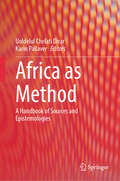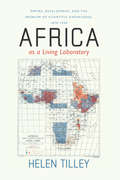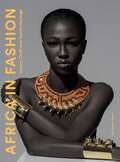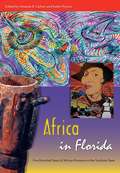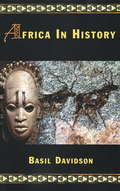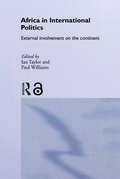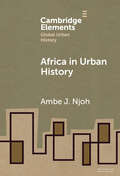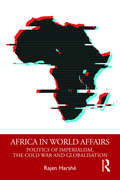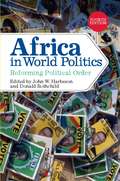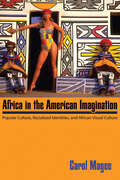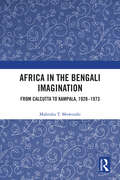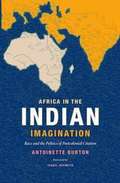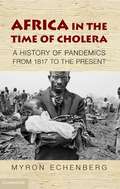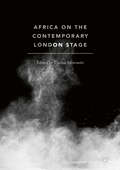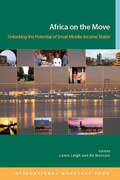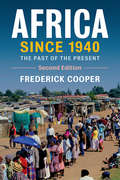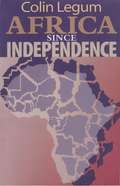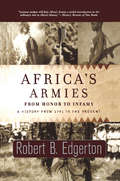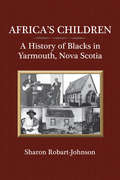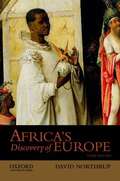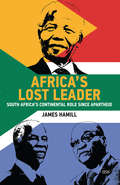- Table View
- List View
Africa as Method: A Handbook of Sources and Epistemologies
by Karin Pallaver Uoldelul Chelati DirarThis methods handbook investigates the multiple sources and interdisciplinary methodologies employed by scholars working on Africa. It illuminates how scholars of Africa locate, select, interpret, and combine sources to reconstruct Africa’s past. Each contributor presents a specific typology of source or body of sources. Focusing on specific case studies, the chapters offer a broad overview of the methods and sources employed by historians, anthropologists, linguists, and related disciplines in the humanities and social sciences, working on Africa. The topics covered are diverse and include the significance of oral sources and how they relate to written sources; the perspectives provided by female writings on and from Africa; the relevance of Islamic court records for the study of Africa; the use of songs and poetry for the understanding of contemporary political protests; the employment of photographs and other visual sources for the study of the African past; how new sources or new interpretations of existing ones can provide different historical periodization; and finally, how biographies and autobiographies, including personal experiences with fieldwork in Africa, can contribute to shed light on Africa’s past. The book is a valuable resource for graduate students and academics interested in doing research on Africa. It provides a sweeping but rich understanding of the methodologies in the field of African studies, and for historians in general. Ultimately, this book contends that the specific methodologies developed for the study of Africa are relevant not only for the understanding of the continent itself, but can also contribute significantly to the historical method more widely.
Africa as a Living Laboratory: Empire, Development, and the Problem of Scientific Knowledge, 1870–1950
by Helen TilleyTropical Africa was one of the last regions of the world to experience formal European colonialism, a process that coincided with the advent of a range of new scientific specialties and research methods. Africa as a Living Laboratory is a far-reaching study of the thorny relationship between imperialism and the role of scientific expertise—environmental, medical, racial, and anthropological—in the colonization of British Africa. A key source for Helen Tilley’s analysis is the African Research Survey, a project undertaken in the 1930s to explore how modern science was being applied to African problems. This project both embraced and recommended an interdisciplinary approach to research on Africa that, Tilley argues, underscored the heterogeneity of African environments and the interrelations among the problems being studied. While the aim of British colonialists was unquestionably to transform and modernize Africa, their efforts, Tilley contends, were often unexpectedly subverted by scientific concerns with the local and vernacular. Meticulously researched and gracefully argued, Africa as a Living Laboratory transforms our understanding of imperial history, colonial development, and the role science played in both.
Africa in Fashion: Luxury, Craft and Textile Heritage
by Ken Kweku NimoAfrica in Fashion explores the kaleidoscope of craft cultures that have shaped African fashion for centuries and captures the intriguing stories of contemporary and avant-garde African brands.Part One looks at Africa's rich cultural heritage and place in the network of global fashion. The first chapter retells the history of African fashion, exploring Africa's textile traditions, artisanship and role as a global resource. The second chapter presents a New Africa and examines the promise and potential of Africa's markets, while challenging stereotypes and the concept of European hegemony particularly in the realm of luxury fashion. It also spotlights Africa's unique position as the global industry shifts towards a more sustainable future. Part Two ushers the reader into the spectacular world of African fashion today. It showcases a carefully curated set of the continent's most dynamic brands and, through interviews with prominent and inspiring designers, offers rare insight into their ethos and design practice. Covering unisex fashion, menswear, womenswear, accessories and jewellery the brands are each purposefully selected to contribute uniquely to the mosaic of Africa evolving creative landscape.
Africa in Fashion: Luxury, Craft and Textile Heritage
by Ken Kweku NimoAfrica in Fashion explores the kaleidoscope of craft cultures that have shaped African fashion for centuries and captures the intriguing stories of contemporary and avant-garde African brands.Part One looks at Africa's rich cultural heritage and place in the network of global fashion. The first chapter retells the history of African fashion, exploring Africa's textile traditions, artisanship and role as a global resource. The second chapter presents a New Africa and examines the promise and potential of Africa's markets, while challenging stereotypes and the concept of European hegemony particularly in the realm of luxury fashion. It also spotlights Africa's unique position as the global industry shifts towards a more sustainable future. Part Two ushers the reader into the spectacular world of African fashion today. It showcases a carefully curated set of the continent's most dynamic brands and, through interviews with prominent and inspiring designers, offers rare insight into their ethos and design practice. Covering unisex fashion, menswear, womenswear, accessories and jewellery the brands are each purposefully selected to contribute uniquely to the mosaic of Africa evolving creative landscape.
Africa in Florida: Five Hundred Years of African Presence in the Sunshine State
by Amanda B. Carlson Robin Poynor"An inspiring, original, and significant work that takes our notions of 'diaspora' to exciting places and offers new and thoughtful data on the presence and impact of 'Africa' in Florida history, lives, and objects. Africa in Florida is an important contribution to American history and to the continuing and transforming histories of African diasporas and Africa itself. "--Henry John Drewal, editor of Sacred Waters "Fascinating. Indispensable. With contributions by excellent scholars in the field of African and African diaspora studies and cultural studies, the volume provides diverse meanings and interpretations of contacts among Africans from the continent, Europeans, and indigenous people of Florida that resulted in works of creative arts, language, music, and food. "--Jacob K. Olupona, author of City of 201 Gods Over the course of centuries, immigrants from numerous countries in contemporary Africa have influenced the Sunshine State's history and culture. Through a critical evaluation of the influences and effects of the numerous African and African-influenced cultures that have been a part of the state's history, this collection of essays and art explores how Florida both shapes and is shaped by the multiple African diasporas that move through it. Africa in Florida challenges the way American history and southern studies have characterized African contributions to the development of the United States by showing how Africans, both free and enslaved, asserted themselves as explorers, farmers, slave owners, artists, and more.
Africa in History
by Basil DavidsonThe classic history of Africa from the green Sahara and the Iron Age through the 20th century.Basil Davidson's Africa in History was a landmark in the restoration of African history. For centuries the myth had prevailed that Africa had no history prior to direct contact with European "civilization". This new edition of Basil Davidson's book not only eradicated these myths, but takes account of much of the most recent scholarship about native African civilizations.
Africa in International Politics: External Involvement on the Continent (Routledge Advances in International Relations and Global Politics)
by Paul Williams Ian TaylorLocating Africa on the global stage, this book examines and compares external involvement in the continent, exploring the foreign policies of major states and international organizations towards Africa. The contributors work within a political economy framework in order to study how these powers have attempted to stimulate democracy, peace and prosperity in the context of neo-liberal hegemony and ask whom these attempts have benefited and failed.
Africa in Urban History (Elements in Global Urban History)
by Ambe J. NjohThis Element in Global Urban History seeks to promote understanding of the urban history of Africa. It does so by undertaking four main tasks. Firstly, it employs race, ethnicity, class, and conflict theory as conceptual frameworks to analyze the spatial structures, social, and political-economic dynamics of African cities from global, comparative, and transnational perspectives. Secondly, it proposes a new typology of the continent's cities. Thirdly, it identifies and draws into focus an important but oft-ignored part of Africa's urban history, namely Indigenous cities. It focuses more intensely on the few that still exist to date. Fourthly, it employs conflict, functional, and symbolic interactionist theories as well as elements of the race ideology to explain the articulation of racism, ethnicity, and classism in the continent's urban space. This is done mainly but not exclusively from historical perspectives.
Africa in World Affairs: Politics of Imperialism, the Cold War and Globalisation
by Rajen HarshéAfrica finds itself at the centre stage of world politics in the twenty-first century. To truly determine its rising influence and role in world affairs would mean unravelling the politics of imperialism, the Cold War and globalisation. Going beyond Euro-American perspectives, this book presents a comprehensive study of Africa and its role in world politics. Africa in World Affairs: • Closely examines the transition of Africa in its colonial and post-colonial phases; • Explores the intellectual history of modern Africa through liberation struggles, social movements, leaders and thinkers; • Investigates the continent’s relationships with former colonial powers such as Britain, France and Portugal; untangles complexities of French neo-colonialism and sheds light on the role of the superpower, such as the USA and major and rising powers like China and India; • Highlights complex and wide-ranging diversities of the region, and the ways in which it continues to negotiate with issues of modernity, racism and globalisation. A core text on Africa and the world, this book will be indispensable for students of African studies, politics and international relations, and history. It will also be a must-read for policymakers, diplomats and government think tanks.
Africa in World Politics
by Donald Rothchild John W HarbesonIn this fully revised edition top scholars in African politics address the effects that major currents in Africa and world politics have upon each other and explore the ramifications of this interconnection for contemporary theories of international and comparative politics.The fourth edition focuses on issues of reforming and strengthening states and their economies in sub-Saharan Africa. The nation-state as we know it is a legacy of European rule in Africa, and the primacy of the nation-state remains a bedrock of most contemporary theories of international relations. Yet in the fifth decade of Africa's independence, this colonial inheritance has been challenged as never before by state weakness, internal and inter-state conflict, and internal and external demands for economic and political reform, with potentially far-reaching implications. Including new readings on the AIDS crisis in Africa and the regional war on terrorism, this text remains an invaluable resource for students of African and world politics.
Africa in World Politics
by Donald Rothchild John W HarbesonIn this fully revised edition top scholars in African politics address the effects that major currents in Africa and world politics have upon each other and explore the ramifications of this interconnection for contemporary theories of international and comparative politics.The fourth edition focuses on issues of reforming and strengthening states and their economies in sub-Saharan Africa. The nation-state as we know it is a legacy of European rule in Africa, and the primacy of the nation-state remains a bedrock of most contemporary theories of international relations. Yet in the fifth decade of Africa's independence, this colonial inheritance has been challenged as never before by state weakness, internal and inter-state conflict, and internal and external demands for economic and political reform, with potentially far-reaching implications. Including new readings on the AIDS crisis in Africa and the regional war on terrorism, this text remains an invaluable resource for students of African and world politics.
Africa in World Politics
by HarbesonPolitical scientists and economists examine issues presented by the improvements in domestic economic and politics in sub-Saharan Africa and the emergence of the region onto the world stage. Among their topics are the heritage of colonialism, promising democratization trajectories in Africa's weak states, inter-African negotiations and reforming political order, and China's engagement in Africa. Annotation ©2008 Book News, Inc. , Portland, OR (booknews. com)
Africa in the American Imagination: Popular Culture, Racialized Identities, and African Visual Culture
by Carol MageeIn the American world, the presence of African culture is sometimes fully embodied and sometimes leaves only a trace. Africa in the American Imagination: Popular Culture, Racialized Identities, and African Visual Culture explores this presence, examining Mattel's world of Barbie, the 1996 Sports Illustrated swimsuit issue, and Disney World, each of which repackages African visual culture for consumers. Because these cultural icons permeate American life, they represent the broader U.S. culture and its relationship to African culture. This study integrates approaches from art history and visual culture studies with those from culture, race, and popular culture studies to analyze this interchange. Two major threads weave throughout. One analyzes how the presentation of African visual culture in these popular culture forms conceptualizes Africa for the American public. The other investigates the way the uses of African visual culture focuses America's own self-awareness, particularly around black and white racialized identities. In exploring the multiple meanings that “Africa” has in American popular culture, Africa in the American Imagination argues that these cultural products embody multiple perspectives and speak to various sociopolitical contexts: the Cold War, civil rights, and contemporary eras of the United States; the apartheid and post-apartheid eras of South Africa; the colonial and postcolonial eras of Ghana; and the European era of African colonization.
Africa in the Bengali Imagination: From Calcutta to Kampala, 1928-1973
by Mahruba T. MowtushiThis book examines textual representations of Africa in the Indian imagination from 1928 to 1973. It critically analyses Bengali literature during this period, their imitation of colonial racial prejudices and how it allowed Bengalis to fashion their identity. It analyses the development of ‘Africa’ as an idea and historical reality through the writings of five Bengali writers including the Bengali novelist Bibhutibhushan Bandyopadhyay, the children’s author Hemendra Kumar Roy, the poet and philosopher Rabindranath Tagore, the playwright Ganesh Bagchi and the surrealist poet and founding editor of Transition magazine Rajat Neogy. The book shows how these writers engage with the idea of Africa and their influence in the construction of the Bengali cultural identity during the freedom struggle, the Partition of Bengal in 1947 and the creation of Bangladesh in 1971. The book offers readers a glimpse of the exotic imaginary locales of Africa while offering an in-depth look into the interconnected histories, cartographic routes and cultural exchange between India and Africa. A first of its kind, this book will be an excellent read for students and scholars of literature, comparative literature, history, cultural studies, postcolonial studies, South Asian studies, African studies and diaspora studies. .
Africa in the Indian Imagination: Race and the Politics of Postcolonial Citation
by Antoinette BurtonIn Africa in the Indian Imagination Antoinette Burton reframes our understanding of the postcolonial Afro-Asian solidarity that emerged from the 1955 Bandung conference. Afro-Asian solidarity is best understood, Burton contends, by using friction as a lens to expose the racial, class, gender, sexuality, caste, and political tensions throughout the postcolonial global South. Focusing on India's imagined relationship with Africa, Burton historicizes Africa's role in the emergence of a coherent postcolonial Indian identity. She shows how--despite Bandung's rhetoric of equality and brotherhood--Indian identity echoed colonial racial hierarchies in its subordination of Africans and blackness. Underscoring Indian anxiety over Africa and challenging the narratives and dearly held assumptions that presume a sentimentalized, nostalgic, and fraternal history of Afro-Asian solidarity, Burton demonstrates the continued need for anti-heroic, vexed, and fractious postcolonial critique.
Africa in the Time of Cholera
by Myron EchenbergThis book combines evidence from natural and social sciences to examine the impact on Africa of seven cholera pandemics since 1817, particularly the current impact of cholera on such major countries as Senegal, Angola, Mozambique, Congo, Zimbabwe and South Africa. Myron Echenberg highlights the irony that this once-terrible scourge, having receded from most of the globe, now kills thousands of Africans annually - Africa now accounts for more than 90 percent of the world's cases and deaths - and leaves many more with severe developmental impairment. Responsibility for the suffering caused is shared by Western lending and health institutions and by often venal and incompetent African leadership. If the threat of this old scourge is addressed with more urgency, great progress in the public health of Africans can be achieved.
Africa in the World: Capitalism, Empire, Nation-State
by Frederick CooperAt the Second World War's end, it was clear that business as usual in colonized Africa would not resume. W. E. B. Du Bois's The World and Africa, published in 1946, recognized the depth of the crisis that the war had brought to Europe, and hence to Europe's domination over much of the globe. Du Bois believed that Africa's past provided lessons for its future, for international statecraft, and for humanity's mastery of social relations and commerce. Frederick Cooper revisits a history in which Africans were both empire-builders and the objects of colonization, and participants in the events that gave rise to global capitalism. Of the many pathways out of empire that African leaders envisioned in the 1940s and 1950s, Cooper asks why they ultimately followed the one that led to the nation-state, a political form whose limitations and dangers were recognized by influential Africans at the time. Cooper takes account of the central fact of Africa's situation--extreme inequality between Africa and the western world, and extreme inequality within African societies--and considers the implications of this past trajectory for the future. Reflecting on the vast body of research on Africa since Du Bois's time, Cooper corrects outdated perceptions of a continent often relegated to the margins of world history and integrates its experience into the mainstream of global affairs.
Africa on the Contemporary London Stage
by Tiziana MorosettiThis collection of essays investigates the way Africa has been portrayed on the London stage from the 1950s to the present. It focuses on whether — and, if so, to what extent — the Africa that emerges from the London scene is subject to stereotype, and/or in which ways the reception of audiences and critics have contributed to an understanding of the continent and its arts. The collection, divided into two parts, brings together well-established academics and emerging scholars, as well as playwrights, directors and performers currently active in London. With a focus on Wole Soyinka, Athol Fugard, Bola Agbaje, Biyi Bandele, and Dipo Agboluaje, amongst others, the volume examines the work of key companies such as Tiata Fahodzi and Talawa, as well as newer companies Two Gents, Iroko Theatre and Spora Stories. Interviews with Rotimi Babatunde, Ade Solanke and Dipo Agboluaje on the contemporary London scene are also included.
Africa on the Move: Unlocking the Potential of Small Middle-Income States
by Lamin Leigh Ali MansoorThis publicationd escribes the reforms needed to move small middle-income countries in sub-Saharan Africa to advanced-economy status. The result of intense discussions with public officials in the countries covered, the book blends rigorous theory, econometrics, and practitioners' insights to come up with practical recommendations for policymakers. It spans topics from macroeconomic vulnerability and reserve adequacy to labor market institutions and financial inclusion. The publicaiton is a must-read for researchers interested in the economic issues facing developing countries in sub-Saharan Africa.
Africa since 1940: The Past of the Present (New Approaches to African History #13)
by Frederick CooperAfrica since 1940 is the flagship textbook in Cambridge University Press' New Approaches to African History series. Now revised to include the history and scholarship of Africa since the turn of the millennium, this important book continues to help students understand the process out of which Africa's position in the world has emerged. A history of decolonisation and independence, it allows readers to see just what political independence did and did not signify, and how men and women, peasants and workers, religious and local leaders sought to refashion the way they lived, worked and interacted with each other. Covering the transformation of Africa from a continent marked by colonisation to one of independent states, Frederick Cooper follows the 'development question' across time, seeing how first colonial regimes and then African elites sought to transform African society in their own ways. He shows how people in cities and villages tried to make their way in an unequal world, through times of hope, despair, renewed possibilities, and continued uncertainties. Looking beyond the debate over what or who may be to blame, Cooper explores alternatives for the future.
Africa since Independence
by Colin LegumActivist, scholar, and political journalist Colin Legum assesses Africa's experience since independence and offers judicious predictions about the continent's future. Covering 50 years of sweeping change, this provocative and insightful book examines Africa's struggle for democracy, mounting economic problems, and AIDS.
Africa's Armies: From Honor to Infamy a History from 1791 to the Present
by Robert B. EdgertonAfrica’s Armies traces the military history of sub-Saharan Africa from the pre-colonial era to the present. Robert Edgerton begins this sweeping chronicle by describing the role of African armies in pre-colonial times, when armed forces or militias were essential to the maintenance and prosperity of their societies. During the colonial era, African soldiers fought with death-defying courage, earning such respect as warriors that they were often recruited into the colonial armies not simply to enforce colonial rule in Africa, but to fight for the European homelands as well. After independence swept through Africa, African military men seized political power in country after country, ruling dictatorially for their own benefit and for that of their kinsmen and cronies. The author describes the post-colonial civil wars that have devastated much of sub-Saharan Africa – catastrophes marked by genocide, famine, disease, economic collapse, and steadily declining life expectancy. He closes by describing the role that Africa’s military forces can and must play if the future is to bring better times to the continent’s many peoples.
Africa's Children: A History of Blacks in Yarmouth, Nova Scotia
by Sharon Robart-Johnson"Africa’s Children is a testament to one’s heritage, a belief in one’s ancestors, and a record of truth … no told!" – Dr. Henry V. Bishop, chief curator, Black Cultural Centre, Dartmouth, Nova Scotia Chronicling the history of Black families of the Yarmouth area of Nova Scotia, Africa’s Children is a mirror image of the hopes and despairs and the achievements and injustices that mark the early stories of many African-Canadians. This extensively researched history traces the lives of those people, still enslaved at the time, who arrived with the influx of Black Loyalists and landed in Shelburne in 1783, as well as those who had come with their masters as early as 1767. Their migration to a new home did little to improve their overall living conditions, a situation that would persist for many years throughout Yarmouth County. By drawing on a comprehensive range of sources that include census and cemetery records, church and school histories, libraries, museums, oral histories, newspapers, wills, The Black Loyalist Directory, and many others, this is a history that has been overlooked for far too long.
Africa's Discovery of Europe (Third Edition)
by David NorthrupThis groundbreaking book examines the full range of African-European encounters from an unfamiliar African perspective rather than from the customary European one. By featuring vivid life stories of individual Africans and drawing upon their many recorded sentiments, David Northrup presentsAfrican perspectives that persuasively challenge stereotypes about African-European relations as they unfolded in Africa, Europe, and the Atlantic world between 1450 and 1850. The text features thematically organized chapters that explore first impressions, religion and politics, commerce and culture, imported goods and technology, the Middle Passage, and Africans in Europe. In addition, Northrup offers a thoughtful examination of Africans' relations - intellectual,commercial, cultural, and sexual - with Europeans, tracing how the patterns of behavior that emerged from these encounters shaped pre-colonial Africa. The book concludes with an examination of the roles of race, class, and culture in early modern times, pointing out which themes in Africa'scontinuing discovery of Europe after 1850 were similar to earlier patterns, and why other themes were different.
Africa's Lost Leader: South Africa's continental role since apartheid
by James HamillWhen Nelson Mandela was sworn in as president on 10 May 1994, South Africa enjoyed an unprecedented global standing. Much of the international community, particularly Western states, saw the new South Africa as well equipped to play a dynamic and dominant role on the continent; promoting conflict resolution, economic development, and acting as a standard-bearer for democracy and human rights.Yet, throughout the presidencies of Nelson Mandela, Thabo Mbeki and Jacob Zuma, South Africa has failed to deliver on this early promise. Its continental primacy has been circumscribed by its own reluctance to lead, combined with widespread African hostility to its economic expansion, antipathy towards its democratic ideals and scepticism about its suitability as Africa�s global representative. With an onerous domestic agenda, as it continues to tackle the profound socio-economic legacies of apartheid, and with its military power also on the wane, South Africa must now adapt to an emerging multipolarity on the continent. This transition � which may produce a new concert of African powers working in constructive collaboration or lead to fragmentation, discord and gridlock � is likely to determine Africa�s prospects for decades to come.This Adelphi book squarely challenges the received wisdom that South Africa is a dominant power in Africa. It explores the country�s complex and difficult relationship with the rest of the continent in the post-apartheid era and examines the ways in which the country has struggled to translate its economic, military and diplomatic weight into tangible foreign policy successes and enduring influence on the ground. The conclusions of this book will be valuable to academics, policymakers, journalists, and business leaders seeking to understand the evolution and trajectory of South African policy in Africa.
